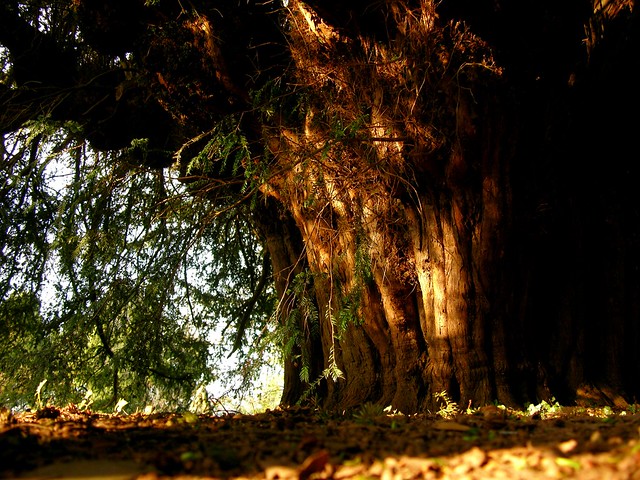Words for yew (tree) (Taxus baccata) in Celtic languages:
| Proto-Celtic | *eburos [d̪ˠaɾʲ] = yew (tree) |
|---|---|
| Celtiberian | ebur- = yew (tree) |
| Gaulish | eburo- = yew (tree) |
| Old Irish (Goídelc) | ibar [d̪ˠaɾʲ] = yew (tree) |
| Irish (Gaeilge) | iúr [uːɾˠ] = yew (tree) iubhar [ˈju.əɾ] = yew (tree) |
| Scottish Gaelic (Gàidhlig) | iubhar / iùbhar [ju.ər] = yew (tree), bow |
| Manx (Gaelg) | euar = yew (tree) |
| Proto-Brythonic | *eβor = yew (tree) |
| Middle Welsh (Kymraec) | efwr, ewr, ewur, evwr = hogweed, cow parsnip |
| Welsh (Cymraeg) | efwr [ˈɛvʊr / ˈeːvʊr] = cow parsnip, hogweed |
| Cornish (Kernewek) | evor = hogweed |
| Old Breton | heuor / euor = yew |
| Breton (Brezhoneg) | evor = alder buckthorn |
Etymology: from the Proto-Indo-European *h₁ebʰros (yew) [source].
Words marked with a * are reconstructions.
Sources: Wiktionary, Am Faclair Beag, teanglann.ie, On-Line Manx Dictionary, Geiriadur Prifysgol Cymru, Gerlyver Kernewek, Dictionnaire Favereau
Words for yew (tree) in Celtic languages:
| Proto-Celtic | *iwos = yew (tree) |
|---|---|
| Gaulish | *iwos = yew (tree) |
| Old Irish (Goídelc) | eó [eːo̯] = stem, shaft, yew, tree |
| Irish (Gaeilge) | eo [oː/ɔː] = yew tree (literary) |
| Scottish Gaelic (Gàidhlig) | iodh [jɤɣ] = yew tree |
| Proto-Brythonic | *ɨwī / *ɨwɨnā = yew (tree) |
| Welsh (Cymraeg) | yw [ɨ̞u̯ / ɪu̯] = yew (tree), yew-wood |
| Old Cornish | hiuin = yew (tree) |
| Cornish (Kernewek) | ewin = yew (tree) |
| Breton (Brezhoneg) | iwin / ivin = yew (tree) |
Etymology: from the Proto-Indo-European *h₁eyHweh₂ (yew) [source].
Words marked with a * are reconstructions.
Sources: Wiktionary, Am Faclair Beag, teanglann.ie, On-Line Manx Dictionary, Geiriadur Prifysgol Cymru, Gerlyver Kernewek, Dictionnaire Favereau

‘Efwr’ is still present (and currently used) in modern Welsh, with the same meaning of ‘hogweed, cow parsnip’.